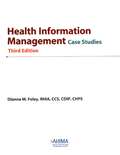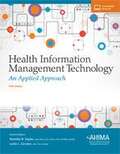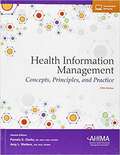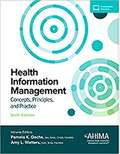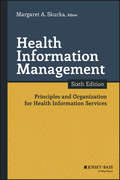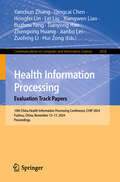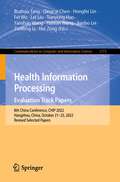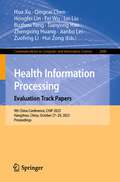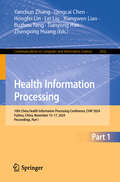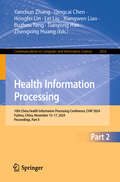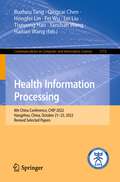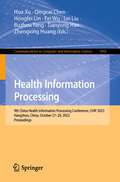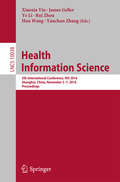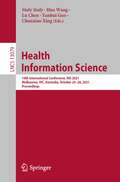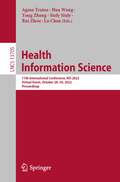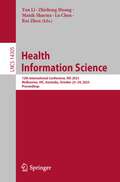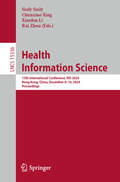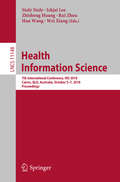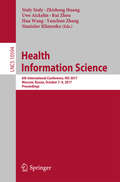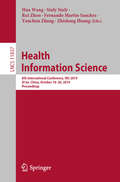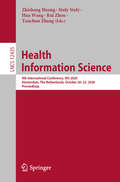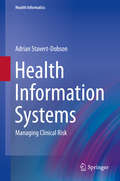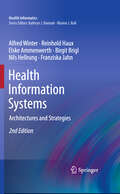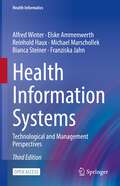- Table View
- List View
Health Information Management Case Studies
by Diana FoleyHealth Information Management Case Studies
Health Information Management Technology An Applied Approach 5th Edition
by Leslie L. Gordon Nanette B. SaylesCreates a blueprint for success in the health information management (HIM) field. Chapter content is expanded in the fifth edition to prepare students for transitional and changing roles in an electronic health information environment. All chapters are updated to reflect current HIM trends, practices, standards, and legal issues. Written by distinguished leaders in the field, this book guides students through two-year academic programs in preparation for the Registered Health Information Technician (RHIT) certification exam and beyond
Health Information Management: Concepts, Principles, and Practice
by American Health Information Management AssociationHealth Information Management: Concepts, Principles and Practice, Fifth Edition, is a textbook for students and healthcare professionals alike. <p><p> Proper management of health information is critical for the healthcare industry to advance and improve in areas of cost, access, and quality. Recognizing the pivotal role that health information plays when collected and stored accurately and completely so that it can then be analyzed to make critical clinical, financial, administrative and ethical decisions in healthcare is at the core of the health information management (HIM) profession. <p><p> This book offers content to assist students and professionals already working in the healthcare field to understand the value of quality information from the point of patient-specific data collection to the aggregation of that data to generate information that can then be utilized to increase knowledge and support decision-making. The content of this book is modeled after the current HIM curriculum and the RHIA exam domains. This book guides the path for excellence in four-year baccalaureate programs and identifies the critical competencies in the HIM discipline today. The text is a foundation for successfully executing curriculum requirements, a preparation guide for the RHIA exam, and a resource for practicing healthcare and health information professionals in a variety of roles. <p><p> Key Features: Organized to reflect current curriculum map for AHIMA and Commission on Accreditation for Health Informatics and Information Management Education (CAHIIM) accredited programs Foundational text for RHIA certification study New topics include data governance and stewardship, health data analytics, data visualization, clinical documentation improvement, consumer informatics, and data privacy and security Chapters contain new illustrations such as dashboard examples, the interoperability roadmap, a model of the learning health system, and a model for consumer health in
Health Information Management: Concepts, Principles, and Practice
by Pamela Oachs WattersHealth Information Management: Concepts, Principles, and Practice, Sixth Edition, is a textbook for students and healthcare professionals alike. <p><p> Proper management of health information is critical for the healthcare industry to advance and improve in areas of cost, access, and quality. The core of the health information management (HIM) profession is recognizing the pivotal role that health information plays when collected and stored accurately and completely so that it can then be analyzed to make critical clinical, financial, administrative, and ethical decisions in healthcare. <p><p> This book offers content to help students and professionals already working in the healthcare field understand the value of quality information from the point of patient-specific data collection to the aggregation of that data to generate information that can then be utilized to increase knowledge and support decision-making. The content of this book is modeled after the 2018 AHIMA HIM curricula competencies and the RHIA exam domains. This book sets the path for excellence in four-year baccalaureate programs and identifies the critical competencies in the HIM discipline today. The text is a foundation for successfully executing curriculum requirements, a preparation guide for the RHIA exam, and a resource for practicing healthcare and health information professionals in a variety of roles.
Health Information Management: Principles and Organization for Health Information Services (Jossey-Bass Public Health #19)
by Margaret A. SkurkaThe Updated and Extensively Revised Guide to Developing Efficient Health Information Management Systems Health Information Management is the most comprehensive introduction to the study and development of health information management (HIM). Students in all areas of health care gain an unmatched understanding of the entire HIM profession and how it currently relates to the complex and continuously evolving field of health care in the United States. This brand-new Sixth Edition represents the most thorough revision to date of this cornerstone resource. Inside, a group of hand-picked HIM educators and practitioners representing the vanguard of the field provide fundamental guidelines on content and structure, analysis, assessment, and enhanced information. Fully modernized to reflect recent changes in the theory and practice of HIM, this latest edition features all-new illustrative examples and in-depth case studies, along with: Fresh and contemporary examinations of both electronic and print health records, data management, data privacy and security, health informatics and analytics, and coding and classification systems An engaging and user-friendly pedagogy, complete with learning objectives, key terms, case studies, and problems with workable solutions in every chapter Ready-to-use PowerPoint slides for lectures, full lesson plans, and a test bank for turnkey assessments A must-have resource for everyone in health care, Health Information Management, Sixth Edition, puts everything you need at your fingertips.
Health Information Processing. Evaluation Track Papers: 10th China Health Information Processing Conference, CHIP 2024, Fuzhou, China, November 15–17, 2024, Proceedings (Communications in Computer and Information Science #2458)
by Lei Liu Yanchun Zhang Hongfei Lin Tianyong Hao Xiangwen Liao Buzhou Tang Qingcai Chen Jianbo Lei Zuofeng Li Hui Zong Zhengxing HuangThis book constitutes the refereed proceedings of the 10th China Health Information Processing Conference, CHIP 2024, held in Fuzhou, China, November 15–17, 2024.The CHIP 2024 Evaluation Track proceedings include 19 full papers which were carefully reviewed and grouped into these topical sections: syndrome differentiation thought in Traditional Chinese Medicine; lymphoma information extraction and automatic coding; and typical case diagnosis consistency.
Health Information Processing. Evaluation Track Papers: 8th China Conference, CHIP 2022, Hangzhou, China, October 21–23, 2022, Revised Selected Papers (Communications in Computer and Information Science #1773)
by Lei Liu Fei Wu Hongfei Lin Tianyong Hao Buzhou Tang Qingcai Chen Yanshan Wang Haitian Wang Jianbo Lei Zuofeng Li Hui ZongThis book constitutes the papers presented at the Evaluation Track of the 8th China Conference on Health Information Processing, CHIP 2022, held in Hangzhou, China during October 21–23, 2022.The 20 full papers included in this book were carefully reviewed and selected from 20 submissions. They were organized in topical sections as follows: text mining for gene-disease association semantic; medical causal entity and relation extraction; medical decision tree extraction from unstructured text; OCR of electronic medical document; clinical diagnostic coding.
Health Information Processing. Evaluation Track Papers: 9th China Conference, CHIP 2023, Hangzhou, China, October 27–29, 2023, Proceedings (Communications in Computer and Information Science #2080)
by Lei Liu Fei Wu Hongfei Lin Tianyong Hao Buzhou Tang Qingcai Chen Jianbo Lei Zuofeng Li Hui Zong Hua Xu Zhengxing HuangThis book constitutes the refereed proceedings of the evaluation track of the 9th China Health Information Processing Conference, CHIP 2023, held in Hangzhou, China, during October 27–29, 2023. The 15 algorithms papers and 6 overview papers included in this book were carefully reviewed and selected from a total of 66 submissions to the conference. They were organized in topical sections as follows: CHIP-PromptCBLUE Medical Large Model Evaluation; Chinese Medical Text Few-shot Named Entity Recognition; Drug Paper Document Recognition and Entity Relation Extraction; CHIP-YIER Medical Large Model Evaluation; Medical Literature PICOS Identification; Chinese Diabetes Question Classification;
Health Information Processing: 10th China Health Information Processing Conference, CHIP 2024, Fuzhou, China, November 15–17, 2024, Proceedings, Part I (Communications in Computer and Information Science #2432)
by Lei Liu Yanchun Zhang Hongfei Lin Tianyong Hao Xiangwen Liao Buzhou Tang Qingcai Chen Zhengxing HuangThis two-volume set CCIS 2432-2433 constitutes the refereed proceedings of the 10th China Health Information Processing Conference, CHIP 2024, held in Fuzhou, China, during November 15–17, 2024. The 32 full papers included in this set were carefully reviewed and selected from 65 submissions. They are organized in topical sections as follows: biomedical data processing and model application; mental health and disease prediction; and drug prediction and knowledge map.
Health Information Processing: 10th China Health Information Processing Conference, CHIP 2024, Fuzhou, China, November 15–17, 2024, Proceedings, Part II (Communications in Computer and Information Science #2433)
by Lei Liu Yanchun Zhang Hongfei Lin Tianyong Hao Xiangwen Liao Buzhou Tang Qingcai Chen Zhengxing HuangThis two-volume set CCIS 2432-2433 constitutes the refereed proceedings of the 10th China Health Information Processing Conference, CHIP 2024, held in Fuzhou, China, during November 15–17, 2024. The 32 full papers included in this set were carefully reviewed and selected from 65 submissions. They are organized in topical sections as follows: biomedical data processing and model application; mental health and disease prediction; and drug prediction and knowledge map.
Health Information Processing: 8th China Conference, CHIP 2022, Hangzhou, China, October 21–23, 2022, Revised Selected Papers (Communications in Computer and Information Science #1772)
by Lei Liu Fei Wu Hongfei Lin Tianyong Hao Buzhou Tang Qingcai Chen Yanshan Wang Haitian WangThis book constitutes refereed proceedings of the 8th China Conference on China Health Information Processing Conference 2022 held in Hangzhou, China from August 26–28, 2022.The 14 full papers presented in this volume were carefully reviewed and selected from a total of 35 submissions. The papers in the volume are organised according to the following topical headings: healthcare natural language processing;healthcare data mining and applications
Health Information Processing: 9th China Health Information Processing Conference, CHIP 2023, Hangzhou, China, October 27–29, 2023, Proceedings (Communications in Computer and Information Science #1993)
by Lei Liu Fei Wu Hongfei Lin Tianyong Hao Buzhou Tang Qingcai Chen Hua Xu Zhengxing HuangThis book constitutes the refereed proceedings of the 9th China Health Information Processing Conference, CHIP 2023, held in Hangzhou, China, during October 27–29, 2023. The 27 full papers included in this book were carefully reviewed and selected from 66 submissions. They were organized in topical sections as follows: healthcare information extraction; healthcare natural language processing; healthcare data mining and applications.
Health Information Science
by Xiaoxia Yin Yanchun Zhang Hua Wang James Geller Ye Li Rui ZhouThis book constitutes the refereed proceedings of the 5th International Conference on Health Information Science, HIS 2016, held in Shanghai, China, in November 2016. The 13 full papers and 9 short papers presented were carefully reviewed and selected from numerous submissions. The scope of the papers includes medical/health/biomedicine information resources such as patient medical records, devices and equipments, software and tools to capture, store, retrieve, process, analyze, and optimize the use of information in the health domain; data management, data mining, and knowledge discovery, all of which play a key role in decision making, management of public health, examination of standards, privacy and security issues; computer visualization and artificial intelligence for computer aided diagnosis; development of new architectures and applications for health information systems.
Health Information Science: 10th International Conference, HIS 2021, Melbourne, VIC, Australia, October 25–28, 2021, Proceedings (Lecture Notes in Computer Science #13079)
by Hua Wang Siuly Siuly Chunxiao Xing Lu Chen Yanhui GuoThis book constitutes the proceedings of the 10th International Conference on Health Information Science, HIS 2021, which took place in Melbourne, Australia, in October 2021.The 16 full papers and 7 short papers presented in this volume were carefully reviewed and selected from 56 submissions. They are organized in topical sections named: COVID-19, EEG data processing, Medical Data Analysis, Medical Record Mining (I), Medical Data Mining (II), Medical Data Processing.
Health Information Science: 11th International Conference, HIS 2022, Virtual Event, October 28–30, 2022, Proceedings (Lecture Notes in Computer Science #13705)
by Hua Wang Yong Zhang Siuly Siuly Rui Zhou Lu Chen Agma TrainaThis book constitutes the refereed proceedings of the 11th International Conference onHealth Information Science, HIS 2022, held in Virtual Event during October 28–30, 2022.The 20 full papers and 9 short papers included in this book were carefully reviewed andselected from 54 submissions. They were organized in topical sections as follows: applications of health and medical data; health and medical data processing; health and medical data mining via graph-based approaches; and health and medical data classification.
Health Information Science: 12th International Conference, HIS 2023, Melbourne, VIC, Australia, October 23–24, 2023, Proceedings (Lecture Notes in Computer Science #14305)
by Yan Li Rui Zhou Lu Chen Zhisheng Huang Manik SharmaThis book constitutes the refereed proceedings of the 12th International Conference on Health Information Science, HIS 2023, held in Melbourne, VIC, Australia, during October 23–24, 2023.The 20 full papers and 9 short papers included in this book were carefully reviewed and selected from 54 submissions. They were organized in topical sections as follows: Depression & Mental Health, Data Security, Privacy & Healthcare Systems, Neurological & Cognitive Disease Studies, COVID-19 Impact Studies, Advanced Medical Data & AI Techniques, Predictive Analysis & Disease Recognition, Medical Imaging & Dataset Exploration, Elderly Care and Knowledge Systems.
Health Information Science: 13th International Conference, HIS 2024, Hong Kong, China, December 8–10, 2024, Proceedings (Lecture Notes in Computer Science #15336)
by Xiaofan Li Siuly Siuly Rui Zhou Chunxiao XingThis book LNCS 15336 constitutes the refereed proceedings of the 13th International Conference on Health Information Science, HIS 2024, held in Hong Kong, China, during December 8-10, 2024. The 18 full papers and 11 short papers were carefully reviewed and selected from 59 submissions. The scope of the conference includes: (1) medical/health/biomedicine information resources, such as patient medical records, devices and equipments, software and tools to capture, store, retrieve, process, analyze, and optimize the use of information in the health domain; (2) data management, data mining, and knowledge discovery, all of which play a key role in decision-making, management of public health, examination of standards, privacy and security issues; (3) computer visualization and artificial intelligence for computer-aided diagnosis; (4) development of new architectures and applications for health information systems.
Health Information Science: 5th International Conference, HIS 2016, Shanghai, China, November 5-7, 2016, Proceedings (Lecture Notes in Computer Science #10038)
by Xiaoxia Yin, James Geller, Ye Li, Rui Zhou, Hua Wang and Yanchun ZhangThis book constitutes the refereed proceedings of the 5th International Conference on Health Information Science, HIS 2016, held in Shanghai, China, in November 2016. The 13 full papers and 9 short papers presented were carefully reviewed and selected from numerous submissions. The scope of the papers includes medical/health/biomedicine information resources such as patient medical records, devices and equipments, software and tools to capture, store, retrieve, process, analyze, and optimize the use of information in the health domain; data management, data mining, and knowledge discovery, all of which play a key role in decision making, management of public health, examination of standards, privacy and security issues; computer visualization and artificial intelligence for computer aided diagnosis; development of new architectures and applications for health information systems.
Health Information Science: 5th International Conference, His 2016, Shanghai, China, November 5-7, 2016, Proceedings (Lecture Notes in Computer Science #10038)
by Wei Xiang Hua Wang Siuly Siuly Rui Zhou Zhisheng Huang Ickjai LeeThis book constitutes the refereed proceedings of the 7th International Conference on Health Information Science, HIS 2018, held in Cairns, QLD, Australia, in October 2018.The 13 full papers and 5 short papers presented were carefully reviewed and selected from 43 submissions. The papers feature multidisciplinary research results in health information science and systems that support health information management and health service delivery. They relate to all aspects of the conference scope, such as medical/health/biomedicine information resources such as patient medical records, devices and equipments, software and tools to capture, store, retrieve, process, analyze, and optimize the use of information in the health domain; data management, data mining, and knowledge discovery, management of public health, examination of standards, privacy and security issues; computer visualization and artificial intelligence for computer aided diagnosis; development of new architectures and applications for health information systems.
Health Information Science: 6th International Conference, HIS 2017, Moscow, Russia, October 7-9, 2017, Proceedings (Lecture Notes in Computer Science #10594)
by Siuly Siuly, Zhisheng Huang, Uwe Aickelin, Rui Zhou, Hua Wang, Yanchun Zhang and Stanislav KlimenkoThis book constitutes the refereed proceedings of the 6th International Conference on Health Information Science, HIS 2017, held in Moscow, Russia, in October 2017.The 11 full papers and 7 short papers presented were carefully reviewed and selected from 44 submissions. The papers feature multidisciplinary research results in health information science and systems that support health information management and health service delivery. They relate to all aspects of the conference scope, such as medical/health/biomedicine information resources such as patient medical records, devices and equipments, software and tools to capture, store, retrieve, process, analyze, and optimize the use of information in the health domain; data management, data mining, and knowledge discovery, management of publichealth, examination of standards, privacy and security issues; computer visualization and artificial intelligence for computer aided diagnosis; development of new architectures and applications for health information systems.
Health Information Science: 8th International Conference, HIS 2019, Xi'an, China, October 18–20, 2019, Proceedings (Lecture Notes in Computer Science #11837)
by Yanchun Zhang Hua Wang Siuly Siuly Rui Zhou Zhisheng Huang Fernando Martin-SanchezThis book constitutes the refereed proceedings of the 8th International Conference on Health Information Science, HIS 2019, held in Xi’an, China, in October 2019. The 14 full papers and 14 short papers presented were carefully reviewed and selected from 60 submissions. The papers are organized in topical sections named: Medical Information System and Platform; Mining Medical Data; EEG and ECG; Medical Image; Mental Health; and Healthcare.
Health Information Science: 9th International Conference, HIS 2020, Amsterdam, The Netherlands, October 20–23, 2020, Proceedings (Lecture Notes in Computer Science #12435)
by Yanchun Zhang Hua Wang Siuly Siuly Rui Zhou Zhisheng HuangThis book constitutes the proceedings of the 9th International Conference on Health Information Science, HIS 2020, which took place in Amsterdam, The Netherlands, during October 20-23, 2020. The 11 full papers and 6 short papers presented in this volume were carefully reviewed and selected from 62 submissions. They were organized in topical sections named: mental health; medical record processing; medical information systems; medical diagnosis with machine learning; and health behavior and medication.
Health Information Systems
by Adrian Stavert-DobsonThis is a practical book for health and IT professionals who need to ensure that patient safety is prioritized in the design and implementation of clinical information technology. Healthcare professionals are increasingly reliant on information technology to deliver care and inform their clinical decision making. Health IT provides enormous benefits in efficiency, communication and decision making. However a number of high-profile UK and US studies have concluded that when Health IT is poorly designed or sub-optimally implemented then patient safety can be compromised. Manufacturers and healthcare organizations are increasingly required to demonstrate that their Health IT solutions are proactively assured. Surprisingly the majority of systems are not subject to regulation so there is little in the way of practical guidance as to how risk management can be achieved. The book fills that gap. The author, a doctor and IT professional, harnesses his two decades of experience to characterize the hazards that health technology can introduce. Risk can never be eliminated but by drawing on lessons from other safety-critical industries the book systematically sets out how clinical risk can be strategically controlled. The book proposes the employment of a Safety Case to articulate and justify residual risk so that not only is risk proactively managed but it is seen to be managed. These simple techniques drive product quality and allow a technology's benefits to be realized without compromising patient safety.
Health Information Systems
by Elske Ammenwerth Alfred Winter Reinhold Haux Franziska Jahn Birgit Brigl Nils HellrungPreviously published as Strategic Information Management in Hospitals; An Introduction to Hospital Information Systems, Health Information Systems Architectures and Strategies is a definitive volume written by four authoritative voices in medical informatics. Illustrating the importance of hospital information management in delivering high quality health care at the lowest possible cost, this book provides the essential resources needed by the medical informatics specialist to understand and successfully manage the complex nature of hospital information systems. Author of the first edition's Foreword, Reed M. Gardner, PhD, Professor and Chair, Department of Medical Informatics, University of Utah and LDS Hospital, Salt Lake City, Utah, applauded the text's focus on the underlying administrative systems that are in place in hospitals throughout the world. He wrote, "These challenging systems that acquire, process and manage the patient's clinical information. Hospital information systems provide a major part of the information needed by those paying for health care." their components; health information systems; architectures of hospital information systems; and organizational structures for information management.
Health Information Systems: Technological and Management Perspectives (Health Informatics)
by Elske Ammenwerth Alfred Winter Reinhold Haux Franziska Jahn Michael Marschollek Bianca SteinerThis heavily revised open access edition provides a thorough overview of the technologies available to assemble, manage and assess the quality of health information systems. It details a variety of scenarios in the context of both health and heath care, including where prevention and wellness are related, such as the treatment of both acute and chronic diseases. Stakeholder requirements are also described to provide perspectives for describing the architectures and management techniques associated with health information systems, enabling the reader to develop a detailed holistic overview of the subject. Health Information Systems: Technological and Management Perspectives features a detailed overview of how information systems in health care can be managed and is a vital resource for medical informatics students seeking an up-to-date text on the topic.
